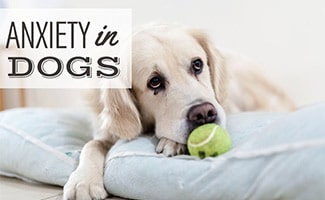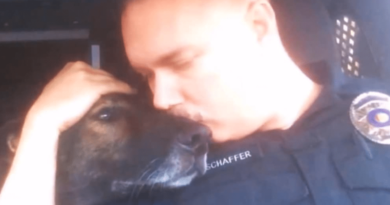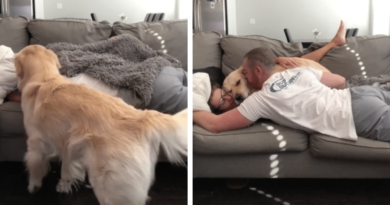Know The Signs And How To Help Your Pup – CanineJournal.com
To sustain this free service, we receive affiliate commissions via some of our links. This doesn’t affect rankings. Our review process.

The good news is that you have many ways to help your pup through turbulent experiences. And it’s best to help manage their anxiety before it worsens or becomes a chronic disorder down the road.
Article Overview
Types Of Dog Anxiety
Dogs can become anxious many reasons, but here are some of the most common causes.
Fear
The fear of loud noises, like thunder and fireworks, is an extremely common cause for anxiety in many dogs. Some dogs also have anxiety-causing fear of strange people, other animals, and even strange objects they don’t recognize.
 Separation Anxiety
Separation Anxiety
Dogs are pack animals and crave company from their family members. They don’t like left being alone. Some dogs handle this better than others. For dogs who cannot comfort themselves well, separation anxiety can result in urinating or defecating in the house, destructive behaviors, and barking.
Learn more about separation anxiety in dogs
Environmental Changes
Riding in a car, going to the vet, traveling, or moving to a new house can cause anxiety in some dogs. Some dogs just don’t like new and strange situations that take them out of their comfort zone.
Symptoms

- Panting
- Pacing
- Shivering
- Excessive barking
- Urinating or defecating in the house
- Destructive behavior (e.g., destroying furniture)
- Self-harm, including excessive licking or chewing
- Restlessness
- Running away or cowering in a corner
- Lip licking
- Looking away
- Aggression
Some of these signs can be occasional and a result of an anxiety-causing situation. But anxiety can become an ongoing issue for some dogs, resulting in more serious problems and a need for continuous treatment.
Treatment
Early intervention is an important part of treating and managing your dog’s anxiety because it can get worse over time.
Suppose you suspect your dog has situational anxiety or more generalized anxiety. In this case, it’s a good idea to consult with your veterinarian to identify causes and develop the most appropriate treatment plan. Depending on the severity of your dog’s anxiety, your vet could recommend the following.
Behavioral Training
Many experts suggest using counterconditioning, a training technique that replaces your dog’s negative associations with situations or stimuli with something positive that he loves.
For example, giving your dog a puzzle toy before you leave can divert your dog’s attention from your absence to playing with a toy full of treats that can occupy him for 15-20 minutes or longer. A frozen peanut butter-filled Kong is also a good choice.
Desensitization is another helpful training strategy for dogs with anxiety. You slowly introduce your dog to the source of stress and reward him for positive behavior. For example, if your dog is anxious about car rides, you can get him near the car on day one and reward him with a treat. Then, the next day you get him in the car and reward him for just sitting in the car. On day three, you take a short drive and reward him.
Keep in mind, each dog is different — some will move through the desensitization stages faster than others. Just be patient and progress at your dog’s pace. Gradual, careful, repeated exposure and rewarding good behavior can be a great way to manage your dog’s anxiety.
If your dog’s anxiety is moderate to severe, you might want to contact a professional dog trainer to help you find the best training approach for your dog.
See more detailed tips on behavioral training for separation anxiety
Prescription Medications
For dogs with a serious anxiety disorder, some veterinarians may recommend prescription medications, such as SSRIs and antidepressants like fluoxetine and clomipramine.
Learn more about clomipramine for dogs
For predictable anxiety-causing situations like fireworks, thunderstorms, or car rides, your veterinarian might prescribe an anti-anxiety medication, such as benzodiazepine, to help your dog cope. Some vets may also recommend gabapentin, tramadol, or trazodone to treat mild to moderate anxiety.
Over-The-Counter Medications
Some vets may recommend Benadryl (diphenhydramine) for mild to moderate situational and temporary anxiety in dogs. But check with your vet first. While it’s generally considered safe for dogs, Benadryl is a sedative. It causes drowsiness, but it can also cause hyperactivity in some dogs, so you’ll need to get your vet’s recommendation for its use and safe dosage.
Natural Remedies
If you’re wary of giving your dog pharmaceuticals, several all-natural supplements and remedies may help relieve his anxiety. But always consult your veterinarian before giving your dog any supplement.
CBD Oil And Treats
You may want to consider CBD oil or treats to help manage your dog’s anxiety. CBD is found in cannabis and hemp, and some dog owners find it effective in treating various health conditions, including anxiety. Learn more about the benefits of CBD for dogs.
Calming Treats

Melatonin
Melatonin is another over-the-counter option to consider for an anxious pup. This is another product to ask your vet about while you are discussing your dog’s stressors and possible treatments. We conducted a deep-dive to find out whether melatonin is safe or not for dogs and you can read more of the details here.
Essential Oils
Lavender essential oil can be useful in treating dog anxiety. It’s safe and gentle for dogs (but harmful for cats!). You can rub a diluted drop into your dog’s ears, fur, and skin to help calm and soothe him.
Learn Proper Essential Oil Use For Dogs
Other Anti-Anxiety Products To Consider
You may also want to consider some of these products to ease your dog’s anxiety.
Calming Collar
A dog anxiety collar may help. The Fedciory Calming Pheromone Collar for Dogs is activated by body heat to emit an odorless pheromone that’s believed to calm stressed pets. The collar starts working within one hour and continues to release the pheromone for up to 30 days. For best results, the manufacturer says your dog should wear it continuously and replace it every four weeks.
Thunder Jacket
Many dog owners find that a ThunderShirt or a similar anxiety vest is a great non-medicinal approach to helping their dogs through stressful events like thunderstorms and fireworks. The concept is that dogs feel more safe and secure when they’re wearing a garment that swaddles and compresses around them.
Learn about ThunderShirts for dogs and noise phobias
Snuggle Puppy
Some puppies and dogs have anxiety issues when you’re just starting crate training. Still, many owners swear by the SmartPetLove Snuggle Puppy Behavioral Aid Toy to ease separation anxiety. This plush anxiety toy has a pulsing heartbeat and a heat pack to mimic the comfort of their mother or littermates.
How Can I Help My Dog With Separation Anxiety?
This brief video from Chewy has some excellent tips on how you can help your dog overcome his separation anxiety.
How Can I Prevent Anxiety In My Dog?
While some dogs are just naturally anxious by nature, there are ways to help your dog avoid anxiety or at least lessen its intensity. Proper socialization to new people, dogs, other animals, and new experiences early on can help prevent anxiety from developing in the first place. Obedience training is also a great way to set your dog up for mental and behavioral success.
How do you help your dog with anxiety?






canada drug pharmacy – https://canadiandrugs.pro/#
tetracycline price in india
can i buy amoxicillin over the counter https://amoxicillin.best/ amoxicillin 875 125 mg tab
dark web link dark web websites dark web market
lana rhoades hot – https://lanarhoades.pro/ lana rhoades boyfriend